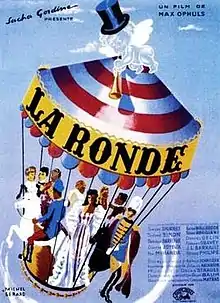La Ronde (1950 film)
La Ronde is a 1950 French film directed by Max Ophüls and based on Arthur Schnitzler's 1897 play La Ronde.
| La Ronde | |
|---|---|
 Theatrical poster | |
| Directed by | Max Ophüls |
| Produced by | Ralph Baum Sacha Gordine |
| Screenplay by | Jacques Natanson Max Ophüls |
| Based on | La Ronde by Arthur Schnitzler |
| Starring | Simone Signoret Serge Reggiani Simone Simon |
| Music by | Oscar Straus |
| Cinematography | Christian Matras |
| Edited by | Léonide Azar |
Release date |
|
Running time | 95 minutes |
| Country | France |
| Language | French |
| Box office | 1,515,560 admissions (France)[1] |
Set in Vienna in 1900, it shows ten amorous encounters across the social spectrum, from a street prostitute to a nobleman, with each scene involving one character from the previous episode. The French term 'La Ronde' can mean any of the following: circling around, doing the rounds, a round of drinks, a circular dance.
The film won the BAFTA award for Best Film and was nominated for two Academy Awards; for Best Writing and Best Art Direction.[2]
Plot
The master of ceremonies opens proceedings by telling the audience that they will see various episodes in the endless waltz of love. A prostitute takes a soldier under a bridge. The soldier picks up a chambermaid at a dance hall. The chambermaid willingly succumbs to the son of her employers. The young man starts an affair with the young wife of an older businessman. She then has an edgy discussion in bed with her husband. The husband takes a shopgirl to a private dining room and gets her drunk. The shopgirl falls for a poet, who is pursuing an affair with an actress. The actress invites a count to visit her in bed next morning. That evening, he gets drunk and ends up in the bed of the prostitute, so completing the circle.
Cast
In order of appearance:
- Anton Walbrook as the Master of Ceremonies
- Simone Signoret as Léocadie, the Prostitute
- Serge Reggiani as Franz, the Soldier
- Simone Simon as Marie, the Chambermaid
- Daniel Gélin as Alfred, the Young Master
- Danielle Darrieux as Emma, the Wife
- Fernand Gravey as Charles, the Husband
- Odette Joyeux as Anna, the Shopgirl
- Jean-Louis Barrault as Robert, the Poet
- Isa Miranda as Charlotte, the Actress
- Gérard Philipe as the Count
Production
Although at the time of production, Schnitzler's son was still enforcing his father's stipulation that the play — Reigen (or La Ronde) — should never be performed or adapted, Ophuls was able to secure the rights to it because of Schnitzler's additional stipulation that his French-language translator was to own the rights to the French version.
Censorship
The film was classified by New York film censors as "immoral" and therefore unacceptable for public screenings. At the end of 1953, the film's producers appealed to the U.S. Supreme Court and, in 1954, La Ronde was approved for exhibition in New York without any cuts.[3]
Reception
Critical response
On Rotten Tomatoes, the film holds an approval rating of 100% based on 15 reviews, with an average rating of 8.21/10.[4]
See also
- La Ronde (1964 film), directed by Roger Vadim, based on the same play
References
- "Box Office Success of Gerard Philippe films". Box Office Story.
- "NY Times: La Ronde". The New York Times. Retrieved 21 December 2008.
- Special to The New York Times (January 1, 1954). "HIGH COURT TO SEE TWO BANNED FILMS / Appeals from Rulings on 'M' and 'La Ronde' Call States' Action Unconstitutional". The New York Times. Retrieved February 17, 2019.
- "La Ronde (1950)". Rotten Tomatoes. Fandango Media. Retrieved May 22, 2019.
External links
- La Ronde at IMDb
- La Ronde at AllMovie
- La ronde: Vicious Circle an essay by Terrence Rafferty at the Criterion Collection